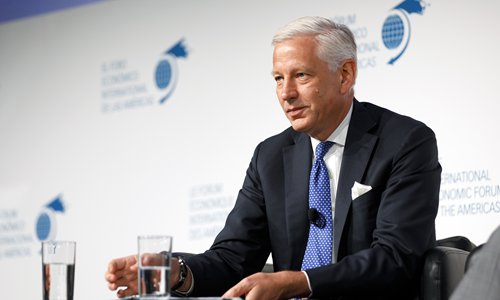HOME >> OPINION
China-Canada relations shouldn’t be held hostage by Ottawa politics
By Ling Shengli Source:Global Times Published: 2019/9/9 20:48:39

Dominic Barton, Canada's ambassador to China Photo: VCG
Canada appointed Dominic Barton, a former McKinsey executive, to be the next Canadian ambassador to China on September 4. However the next day, Canadian Prime Minister Justin Trudeau accused China of using "arbitrary detentions" as a tool in pursuit of political goals. He said that Western allies are concerned about the practice that observers described as "hostage diplomacy." It seems that at a time when the 2019 federal elections are approaching, the Canadian government has failed to sort out its China policy.The arrest of Meng Wanzhou, Chinese tech giant Huawei's chief financial officer, has brought China-Canada relations to their lowest and harmed the interests of both countries. There have been many voices within the two countries calling for a rapprochement. Canada's new ambassador to China was not a career diplomat, but has extensive experience in business and China, which is of vital importance for relations focused on economic cooperation. It's obvious that Canada intends to mend economic and trade relations with China by choosing Barton as the new ambassador. However, given the limited power of the ambassador and Canada's chaotic China policy, it's unrealistic to pin the hope on the new ambassador to promote the improvement of bilateral relations.
Can China-Canada relations come out of the woods? Geng Shuang, spokesman for China's Ministry of Foreign Affairs said on September 5 that China hopes Barton can play an active role in returning ties to a "normal track." Beijing also urged Ottawa to reflect on its mistakes, take China's stance and concerns seriously and immediately release Meng to ensure her safe return to China. By saying so, Beijing not only made clear the crux of the bilateral relationship, but also offered the right "prescription." Canada should take full responsibility for the difficulties relations faced and Ottawa clearly knows the root causes.
Unfortunately, Trudeau's remarks didn't address China's concerns. He accused Beijing of using "arbitrary detentions" as a tool in pursuit of political goals, saying countries including Canada are "all worried about China engaging in the same kinds of pressure tactics with them." Such rhetoric is obviously inappropriate. China detained several Canadians who violated laws in China, while Meng was arrested without breaking any laws of Canada. Where is Canada's rule of law and justice? The Canadian government should reflect upon itself before pointing an accusing finger at China.
Although Trudeau criticized China, he also said he doesn't want to escalate tensions with China and noted Beijing gave speedy approval to the appointment of Barton as Canadian ambassador. It is somewhat indicative of the Canadian government's desire to mend fences with China. Why doesn't it take more pragmatic measures aimed at a thaw?
Beijing should have a clear understanding of the Canadian government's complex attitude toward China. As elections loom, there is no doubt that internal affairs take precedence over diplomacy. As such, it may be difficult for Trudeau to pay attention to improving relations with China.
Beijing should also attach more importance to the complicated public opinion environment in Canada. John McCallum was fired as Canada's ambassador to China because of controversial remarks he made regarding Meng's extradition. The CBC reported that David Mulroney, another former Canadian ambassador to China, said he had been instructed by an official with Global Affairs Canada to clear the air on any public comments on Canada's China policy with the department beforehand and warned against telling Canadians to suspend non-essential travel to China. This shows that it's difficult for Canada to have a consistent voice on its China policy.
The revival of China-Canada relations is in the interest of both sides. Canada is the key to whether bilateral relations come out of the quagmire.
The author is secretary-general of the International Security Study Center at China Foreign Affairs University. opinion@globaltimes.com.cn
Posted in: VIEWPOINT